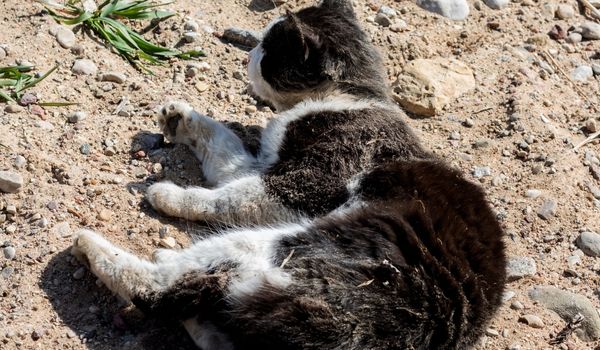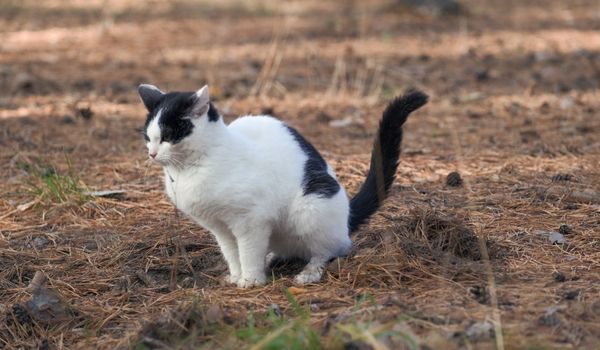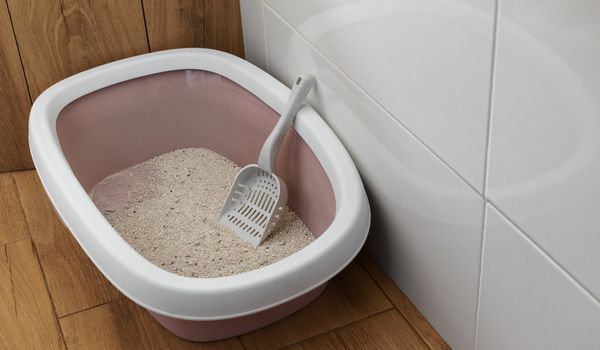You might have often found your furry kitty attracted to the sand. This is because cats love sand: they like its texture and feeling, walking on it, and digging in it. And…they also love to poop in the sand.
But why do cats poop in the sand? Well, for starters, it is in their instincts. We dig deeper into cats pooping in the sand in the lines below.
Why Do Cats Poop in the Sand?
Obsessed with cleanliness, not only themselves but cats also want their surroundings to be clean and tidy. They ensure this by meticulously licking their paws and the rest of the body frequently and dumping their waste properly. Moreover, due to evolution and survival instincts, cats usually bury their poop so that the predators around them may not know their presence.
That is not all – they also hide their excretion to acknowledge the mastery of other cats or even human beings such as their owners. Since cats poo and pee to mark their territory, they politely say that they do not intend to claim it by getting it out of sight.
All these reasons added to cats’ preference to dig soft and loose substances, making sand much more appealing. If your cat has any sand-like item or the sand itself nearby when it is time to use the toilet, she will probably go poop in the sand and then bury it.
The cat might be confusing sand with litter. Even in the wild, where cats are not trained to use the litter box, cats tend to poop in the sand (if it’s available) and cover it. Cats probably prefer to poop in the sand because they can easily bury their poop in the sand.
Is Sand Safe for Cats?
Generally yes, sand is safe for cats since it does not contain any chemical or additive that has significant downsides. So, if your cat goes defecating in the sand, you need not worry. But where it is safe for your cat, it is not safe for you and your family.
Unfortunately, cat poop is a source of different kinds of parasitic infections. If it is not buried properly and remains exposed, chances are, it can make a huge mess and create health risks for the humans around.
For instance, cat feces are the host of T. gondii, an infectious organism that causes toxoplasmosis in human beings. It can also lead to blindness and serious brain infections, and if the immune system is already weakened due to, say, HIV, death can also occur.
If you have a sandbox on your lawn for your kids to play with, your kitty would think of it as a giant litter box. If your cat relieves herself in the sandbox and then burry it, and when your kids play with the same sand, they will make contact with the feces and all the germs and parasites.
If the kids accidentally ingest parasites, they will be at risk of serious health issues.
Pregnant Women Should Stay Away From the Litter Box!
Parasites in cat feces can easily affect pregnant women. They can even make their way to the fetus, causing birth defects and even death.
How to Keep Your Cat Away From Sand?
Sand is neither harmful to cats, nor do cats pooping in sand pose any risk to humans unless they come in contact with the contaminated sand. So, whether your cat defecates in the sand or anywhere else outside the litter box in your home, i.e., on your bed, the risk will be the same.
Therefore, your goal should be to make your kitty relieve herself only in the litter box – the designated and recommended place to avoid any kind of mess and health risks.
Use Sand in the Litter Box
Though the sand is not commonly used as cat litter, in case of emergency or if no other option is available, or if your cat is really into the sand, you can try replacing the substrate in her litter box with it. Just make sure that the sand you use is soft, loose, and granular.
Also, note that you must be ready to face the following cons of using sand as cat litter:
- Sand does not guarantee odor control. The litter box can get stinky.
- Since sand does not clump, the litter box would need frequent cleaning sessions.
- Since sand is lighter in weight, your cat can easily get it flying everywhere while trying to dig.
Cover the Sand
Never leave the places containing sand open when your cat is roaming free, especially if it is toilet time. If you have a sandbox, consider covering it using DIY covers or with a simple plastic sheet. Similarly, if you have sand containers in your home to be used in some kind of construction work, never leave them uncovered until the job is done.
Take the Help of Repellents
Fortunately, various products are available to deter cats from entering the restricted zone. Get one of these repellents and install it in the area containing sand, and your cat will stay away from it.

|
Eyenimal Ultrasonic Outdoor Cat Deterrent safely repels pets from entering a no-go area. It is easy to install and comes in three different noise modes. |
You can also employ DIY methods to deter your cat. For instance, deposit the food items that cats hate around the sandy area. These items work by emanating the pungent smell that cats hate the most. Peels of orange, coffee, and vinegar do good work in this regard. But since the smell vanishes within three to five days, you need to reapply the trick regularly.
Keep Your Cat Inside
An easy fix, avoid letting your cat roam free in the whole house; instead, restrict her movement only to the indoors. Just close the doors and windows to avoid any escape. Besides, make sure that the litter box in the home is always ready to use and more appealing.
If your kitty’s toilet hours are fixed, you can take a chance of letting her move throughout your home the whole day except for those few hours.
Contact a Vet
Your cat does not only poop in the sand or anywhere because of her love for those places. She might be suffering from some disease that makes her poo in undesignated areas. This is often because of worms, stomach problems, or gastric upsets. The vet can easily find out the root cause and address it.
Final Words: Why Do Cats Poop in the Sand?
Cats poop in the sand because of three main reasons: they love it, they can bury their waste in the sand, and they can defecate without marking their territory. Though it might be normal and fun for our feline pals, cat poo in the sand may jeopardize human health severely if you come in contact with the contaminated sand.



